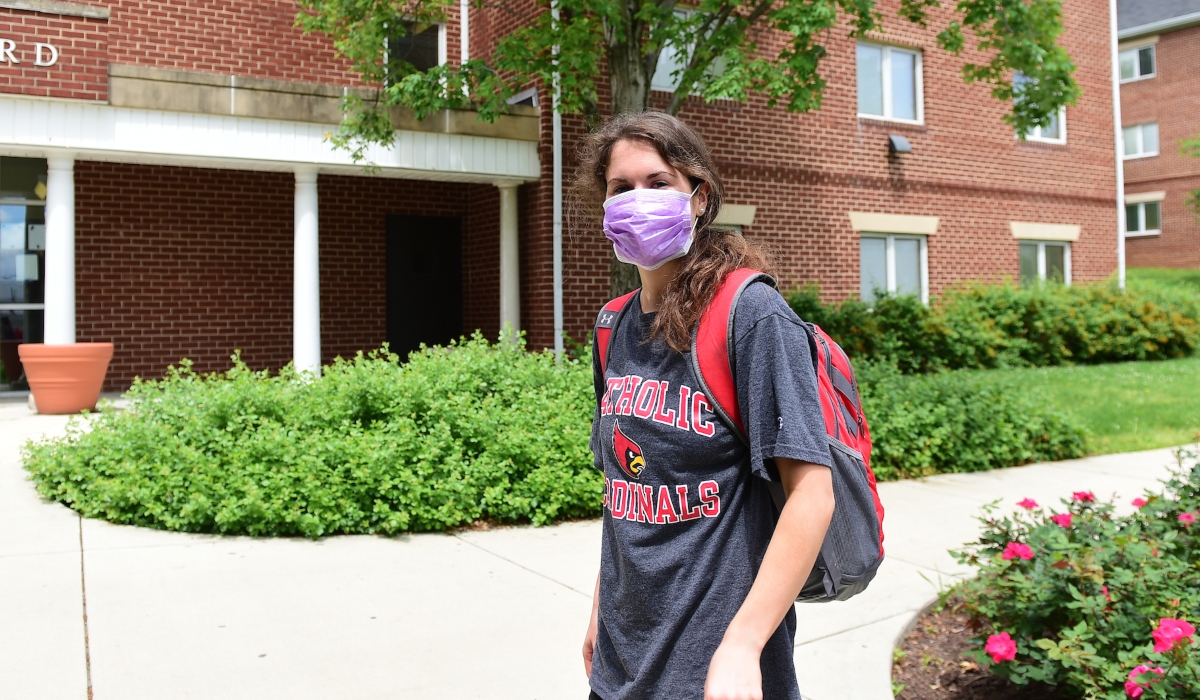

As we prepare for the Fall 2020 semester, please find answers to some common questions under the following subject headings:
Last Updated: July 30, 2020
UPDATED (7/27/20): Our course instruction decisions have been guided by DOH regulations and CDC guidelines. To facilitate these decisions, we conducted an analysis of the classrooms, surveyed faculty, and looked at course enrollments, and have made the following determinations:
UPDATED (7/27/20): All changes to class formats have been made in Cardinal Students and are now available for viewing. Students were notified of the changes by the Vice President for Student Affairs on July 23, 2020. Follow-up emails were also sent out by school deans on July 24, 2020.
If during the semester a class is moved to be completely online, that change will be made immediately in Cardinal Students. Faculty members will also communicate to you the plan for synchronous and/or asynchronous teaching.
If a class is going to be blended or hybrid - there are lots of different ways to do what we plan to do - the faculty member will put that on the syllabus and communicate it to you so you know the expectations of participation in the class.
Students who feel ill should follow the policy spelled out in the syllabus about notifying their instructor of an absence. We need to care for each other as a community, so please exercise prudence if experiencing any symptoms of illness, and of course, please follow protocols if you need to self-quarantine because of exposure.
Changing the Academic Calendar to an earlier start with remote learning after Thanksgiving was the right decision for the health and well-being of our community. Yet, we know that may cause some hardships for students who were planning a later date to return to campus. If you find yourself in this situation, please plan on doing the following:
Textbooks can be purchased online & shipped to the student home or campus address or selected for in-store pick up which will resume after reopening on July 27. B&N will send email updates when the order is ready for pick up or has been shipped. Links and access codes for ebooks will be sent immediately to the student; access will be provided for the entire semester without interruption.
At the end of the Fall semester students will be able to return their rentals in person to the store or mail them back with a free return label provided by B&N.
Due to the unique circumstances of Spring 2020, we will be helping students who need to turn in their rental books once they've arrived back to campus if they were not able to do so in the Spring.
Buyback is a service we offer at the end of semesters that assists us with acquiring used books for store stock as well as our company warehouse. Since buybacks are done in person, this service will be offered from August 16 - September 19 when students will actively be in the store acquiring supplies & books for Fall. Students will need to present their Cardinal Card in order to participate in buybacks.
UPDATED (7/15/20): Most residential students will not be required to be tested before returning to campus, given the most recent guidance from both the CDC and D.C. Department of Health. The University is developing a daily health checker to assist in this regard and will provide access to resources for follow-up in case you are ill. All students should begin daily symptom checks on the University’s daily health checker 14 days before returning to Washington, D.C. This protocol, which will include taking temperature and considering a list of symptoms, will serve the University community through its regular and sustained use.
Any student previously infected with COVID-19 and since recovered should submit documentation to the Student Health Portal of the previous positive COVID-19 test result. The student will also need to have documentation from a primary care provider that the student has passed the CDC recommended time for isolation or quarantine when ill with the coronavirus.
You should let the Dean of Students office deanofstudents@cua.edu know. The Dean of Students will contact your academic dean. You should also email all of your instructors to let them know you will need to participate remotely at the start of the semester.
If someone tests positive, any close contact would need to self-quarantine. A close contact is defined as someone who has been within 6 feet of the Covid-19 positive person for more than 10 minutes. Someone sitting in a classroom more than 6 feet away, or the faculty person in the class, would not necessarily need to self-quarantine. A boyfriend/girlfriend, roommate, or anyone else who would fit the "close contact" definition would need to self-quarantine. They would be contacted by a contact tracer from the DOH as well as possibly by SHS staff, if SHS had ordered the initial test.